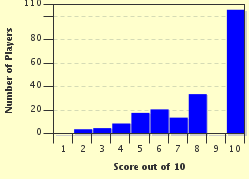
The Forgotten Art of the Instrumental Hit Quiz
Instrumental Rock was an integral part of the early rock and roll era. Sadly this is the exception today where we rarely see instrumentals on the chart. This quiz celebrates the 'golden' age of instrumental rock - the 1960s - 1980s.
A matching quiz
by KayceeKool.
Estimated time: 4 mins.
